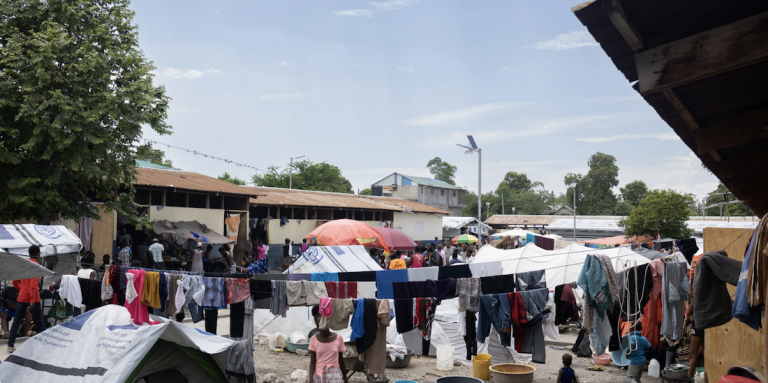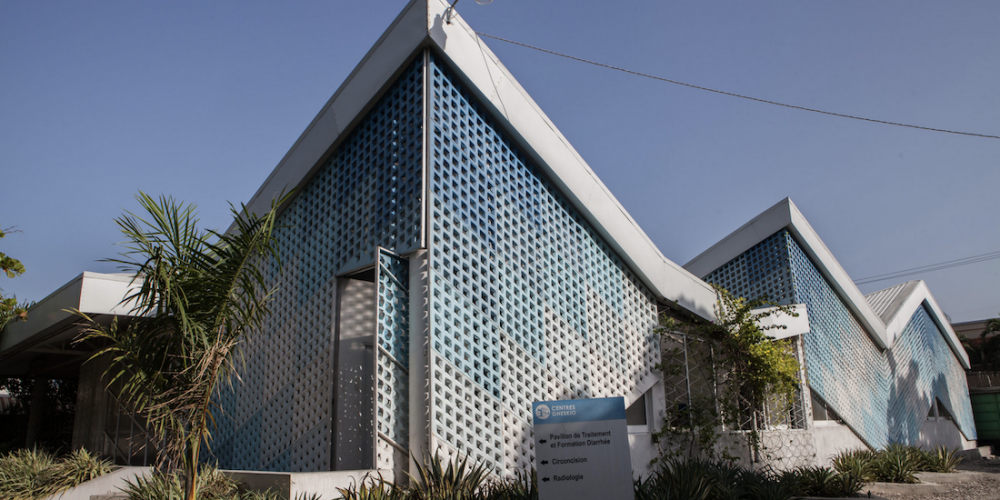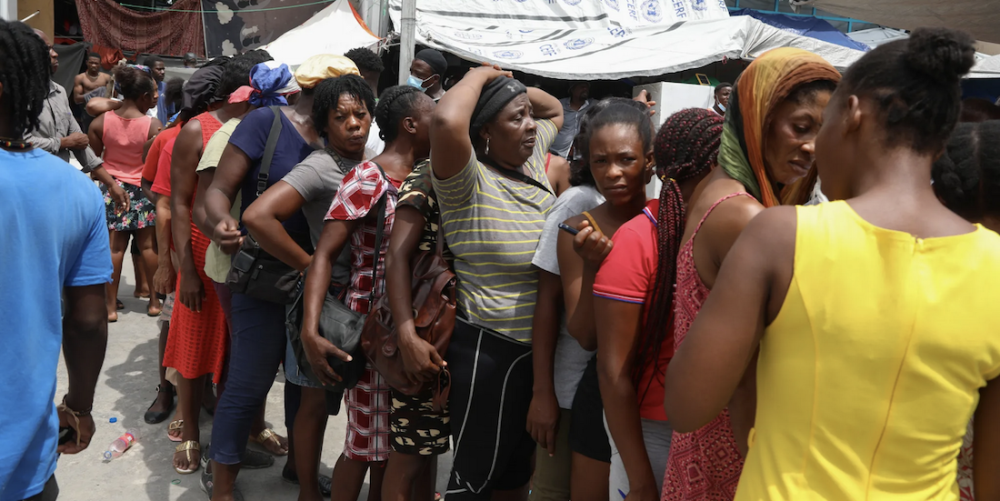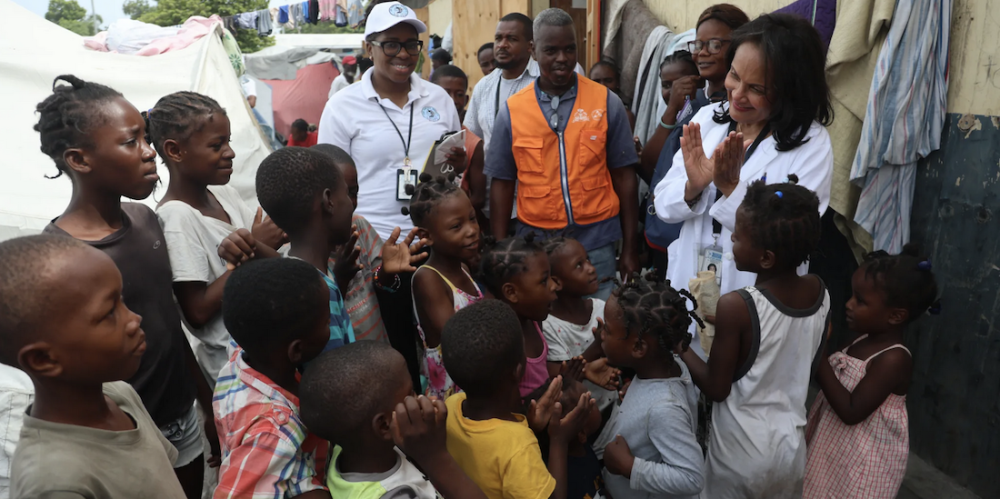
GHESKIO continues life-saving healthcare amid unprecedented security crisis in Port-au-Prince

New York, N.Y. – In the heart of Port-au-Prince, where armed gangs control an estimated 60% of the city and civilian casualties have reached wartime levels, one medical institution continues to serve the most vulnerable populations.
The Groupe Haitien d’Etude du Sarcome de Kaposi et des Infections Opportunistes (GHESKIO) stands as Haiti‘s last remaining healthcare provider in the downtown area, delivering critical services despite what U.N. High Commissioner for Human Rights Volker Türk recently called “a living hell.”
For more than four decades, GHESKIO has operated as Haiti’s largest provider of H.I.V. care in the Caribbean and a world leader in H.I.V.-associated clinical research. Recognized as a public utility by the Haitian government—a designation reserved for organizations essential to the welfare of the Haitian people—GHESKIO has maintained its mission through civil unrest, natural disasters, and now unprecedented gang violence.
Adapting Care During Crisis
The organization’s resilience has been tested repeatedly over the past three years as approximately 200 gangs, armed with military-grade weapons, have terrorized neighborhoods surrounding GHESKIO‘s two locations. The violence has displaced hundreds of thousands of residents and forced most healthcare facilities to close or relocate. Yet GHESKIO has not only remained operational but has innovated its service delivery to ensure continuity of care.
“We adapted our services to facilitate continuity in care,” explains a GHESKIO representative, describing how the organization opened Comprehensive Community Centers (CCCs) to provide antiretroviral therapy (ART) refills, adherence support, and viral load specimen collection. Of 14,835 active patients on ART at GHESKIO, 3,002 (20%) have received treatment at these community centers.
The results demonstrate remarkable success despite extraordinary circumstances. In fiscal year 2021’s first quarter, 88% of people living with H.I.V. who knew their status initiated ART, 82% on ART received viral testing, and 85% of those tested achieved viral suppression—a significant step toward the UNAIDS 95-95-95 targets.

Expanding Beyond H.I.V. Care
While H.I.V. remains central to GHESKIO‘s mission, the organization has expanded its focus to address Haiti’s evolving health challenges. Cardiovascular disease has surpassed H.I.V. as Haiti’s leading cause of mortality over the past decade, accounting for approximately 27% of all deaths compared to 6.7% from H.I.V.
In collaboration with Weill Cornell Medicine, GHESKIO established a cardiovascular disease clinic and research unit to treat hypertension, renal disease, diabetes, stroke, and heart failure. The team has worked with Haiti’s Ministry of Health to create national hypertension guidelines and secure first-line antihypertensive medications.

Empowering Women Through Crisis
Among GHESKIO‘s most impactful programs is its vocational training initiative for women who have experienced abuse. The program provides psychosocial support for domestic violence victims, rape survivors, and former commercial sex workers while teaching participants to create modern furniture and home accessories.
“This program contributes not only to the participants’ economic well-being but builds self-esteem and agency so that women can rely on themselves,” notes program documentation. The initiative has expanded to include a microcredit program focusing on women living with H.I.V. and survivors of gender-based violence. GHESKIO has provided over 5,000 microcredit loans, enabling many participants to achieve financial independence through small businesses.
Protecting Haiti’s Most Vulnerable
GHESKIO‘s commitment extends to Haiti’s children and adolescents through multiple specialized programs. The organization operates a primary school, Ecole Prince Albert II de Commune Monaco, established after the 2010 earthquake to serve underprivileged families. The school has achieved remarkable success, with nearly 100% of students passing standardized state testing and scoring in the top national percentile.
The adolescent program addresses the particular vulnerability of young people to H.I.V., sexually transmitted infections, and early pregnancy through instructor and peer-led education on sexual reproductive health, disease prevention, and family planning.
Maternal and Child Health Excellence
GHESKIO operates the largest pediatric A.I.D.S. clinic in the Americas, addressing critical gaps in Haiti’s maternal and child health system. With approximately 70% of births occurring at home and 25% unattended, Haiti faces severe maternal health challenges. The country’s maternal death rate during childbirth remains the highest in the Western hemisphere, with an estimated 500 deaths per 100,000 births.
The organization’s Mother’s Clubs meet monthly to provide prenatal care education, optimal infant nutrition guidance, and peer support networks. Since implementing these programs alongside antiretroviral therapy prophylaxis, H.I.V. transmission from mother to child at GHESKIO has decreased from 15% to approximately 2%, while infant malnutrition has been reduced by up to 50%.

Community Outreach and Public Health
GHESKIO employs a substantial network of Community Health Workers who conduct outreach in surrounding neighborhoods, including Village de Dieu, Cite l’Eternel, and Cite Plus, serving approximately 120,000 inhabitants. These workers perform active case finding, appointment follow-ups, clinic referrals, and home care for thousands of patients.
The organization has also played a crucial role in Haiti’s cholera response since the epidemic began in 2010. Through collaboration with the Ministry of Health, C.D.C., and UNICEF, GHESKIO developed prevention, care, and training models that reduced cholera rates in its catchment area to nearly zero through water, sanitation, and hygiene (WASH) interventions combined with oral cholera vaccines.
GHESKIO‘s chlorine factory, constructed after the 2010 earthquake, continues to provide chlorine and training for water purification. The organization’s permanent Cholera Treatment Center has served hundreds of thousands of patients throughout the epidemic.
As Haiti faces its most challenging period in recent history, GHESKIO represents hope and resilience in the face of seemingly insurmountable obstacles. Through partnerships with C.D.C., N.I.H., PEPFAR, USAID, and the Global Fund to Fight AIDS, Tuberculosis and Malaria, the organization continues to demonstrate that quality healthcare delivery is possible even in the world’s most difficult circumstances.
Haiti’s Medical Beacon Persists Through Gang Violence (Sept. 10, 2025)
Summary
GHESKIO, Haiti’s largest H.I.V. care provider, continues operating in Port-au-Prince despite unprecedented gang violence. The organization serves 14,835 active A.R.T. patients through innovative community centers, achieving 85% viral suppression rates. Beyond H.I.V., GHESKIO addresses cardiovascular disease, operates successful women’s empowerment and educational programs, and maintains the Caribbean’s largest pediatric A.I.D.S. clinic while reducing mother-to-child H.I.V. transmission from 15% to 2%.